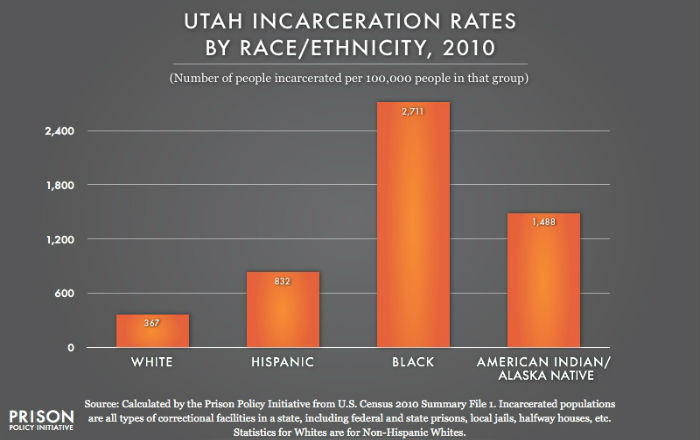 Written by Michael Dillman
Written by Michael Dillman“Despite the fact that whites engage in drug related offenses at a higher rate than African-Americans, African-Americans are incarcerated on drug charges at a rate that is 10 times greater than that of whites.”
Social science research has long concluded that the United States justice system is plagued with institutionalized racism at every level. Mountains of quantitative and qualitative data provide us with an unambiguous narrative: racial discrimination is a critical 21st century contention.
With Ferguson talk storming center stage, Utahns ought to be reflecting inward. Though racial disparities are essentially ubiquitous, it’s clear that Utah is a consistent contributor to the disturbing national data.
“Addressing racism is uncomfortable, but it’s critical…if we don’t face the facts, then we are stuck.”
Just two years ago, The American Civil Liberties Union filed a class-action lawsuit against West high school officials and local police over what was labeled a “gang sweep”. In this so-called sweep, students of color were detained, interrogated, and falsely accused of participating in gang activity. Their personal information was entered into a “gang database,” subjecting them to even more extensive police scrutiny despite never committing a crime. Their story, however, is not unique.
Utah’s school-to-prison pipeline
This coined phrase refers to the extraordinarily harsh policies that systematically push students of color out of schools and into the juvenile justice system. ‘Zero tolerance policies’, the misuse of school resource officers, and the overuse of suspensions and expulsions (particularly racially biased ones) are just a few of the dysfunctional components in Utah schools that lead to the net result that we see in the status quo.
A longitudinal study produced by the University of Utah, and aptly titled: “From Fingerpaint to Fingerprints” (2013) found that – among other deplorable things we’ll discuss – students of color are disciplined three and a half times more often than their Caucasian counterparts in Utah public schools. “It is inevitable that Utah will run into the buzz saw of reality at some point.”
African Americans and Pacific Islanders are more than twice as likely to be given the more severe form of expulsion than Caucasians with similar offenses, and so on. The study concluded that across every category of punishment, students of color in Utah are more likely to be punished than their white counterparts for similar offenses. “Quite honestly, surrounded by racist conservative Republicans – black kids want to go to Utah schools about as much as they enjoy volunteering for a root canal.”
“Unless we look at the underlying attitudes that shape inequality in our state, we won’t be able to address these issue – and we’ll pay the price, economically and socially.”
The LDS church has a historical track record of dogmatic, intolerant, exclusionary, bigoted, racist and across-the-board anti-civil rights attitudes. Black individuals were barred from joining the church in any real capacity (priesthood) until 1978. Here’s an excerpt from lds.org’s “Race and the Priesthood”: “Until 1978—the Church did not ordain men of black African descent to its priesthood or allow black men or women to participate in temple endowment or sealing ordinances.”
While it’s true that the LDS church has made progress, their theological teachings have undeniably been a factor in Utah’s undeviating lag behind the 21st century curve. The antiquated ideology that they’ve recently begun to ditch statically resonates with older members today.
“I’ve lived in Utah for eleven years and, as an educated man of African descent, I can justifiably say that the prejudice here is strong, the racism is systemic, and [it’s] culturally ingrained”
The aggregate picture is not completely bleak, however. Utah faces a momentous dilemma with discrimination, yes, but not an insurmountable one. We have an incredibly long road ahead of us, but if parents, educators, law enforcement, and policymakers all aspire to integrate keeping our children safe, in school, and protected from our racist culture – equality is an obtainable goal.
Resources:
(1) “ACLU of Utah Where EvidenceBased Practices Will Fail Us.” ACLU of Utah Where EvidenceBased Practices Will Fail Us. ACLU, 07 Aug. 2014. Web. 03 Dec. 2014.
(2) Sakala, Leah. “You Might Also Be Interested In:.” Incarceration Rates in Utah. Prison Policy, May 2014. Web. 03 Dec. 2014.
(3) “ACLU of Utah Education Not Incarceration: Challenging The Utah SchoolToPrison Pipeline.” ACLU of Utah Education Not Incarceration: Challenging The Utah SchoolToPrison Pipeline. ACLU, 29 Oct. 2014. Web. 03 Dec. 2014.
(4) “ACLU of Utah Reading Corner: Introduction to the SchooltoPrison Pipeline.” ACLU of Utah Reading Corner: Introduction to the SchooltoPrison Pipeline. ACLU, 08 Oct. 2014. Web.03 Dec. 2014.
(5) Chiang, Emily. “Public Policy Clinic.” SJ Quinney College of Law. Public Policy Clinic at the S.J. Quinney College of Law, Jan. 2014. Web. 03 Dec. 2014.
(6) Pierce, Scott. “KUED Documentary Reveals Utah’s Racist past.” Utah Local News. Salt Lake Tribune, 15 May 2011. Web. 03 Dec. 2014.
(7) “The New Jim Crow Republican Racism in Utah.”Word Press, 13 Feb. 2010. Web. 03 Dec. 2014
(8) Benson, Steve. “Recovery from Mormonism.” If Mormons Think the LDS Church Has Long Opposed Racism, They’re Wrong … ExMormon, Dec. 2013. Web. 03 Dec. 2014.
(9) “Race and the Priesthood.” Race and the Priesthood. LDS.org, 18 Mar. 2014. Web. 03 Dec.2014.
 Michael grew up in Salt Lake City, Utah. He currently attends Utah Valley University (International Relations Major), and is transferring to the University of Utah in the summer of 2015 to study Political Science and Anthropology. He’s a climber, an avid reader, and loves to write.
Michael grew up in Salt Lake City, Utah. He currently attends Utah Valley University (International Relations Major), and is transferring to the University of Utah in the summer of 2015 to study Political Science and Anthropology. He’s a climber, an avid reader, and loves to write.




